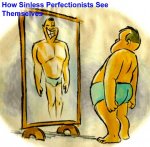G
For the record, I agree with the doctrine of original sin, and I reject Pelagianism and sinless perfectionism.
What I will try to do though is offer my perspective on how SP came about. It came to be, along with Pelagianism, as a reaction to what Pelagius believed to be licentious living in his day. From what I've read about his background, he believed that the concept or doctrine of original sin had been used as an excuse to keep on sinning. In other words, someone could say "well I have a sin nature, and I can't help but sin". Pelagius rightly posited that sin is a choice, but where he went wrong, IMHO, is that he also believed that sin was nothing more than a choice; that man could easily stop sinning altogether if he really wanted to.
Just as Adam and Eve chose to disobey God and eat from the tree of the knowledge of good and evil, so also the rest of mankind, in Pelagius' view can simply choose to or not to sin. According to him, there is no inherited sin nature from Adam. We are all born with a clean slate.
While I believe that sin is indeed a choice, there is the propensity within man to sin just the same. That is why Christ had to come and die for us. If we could just stop sinning on our own, then there was no need for Christ to come. And I also believe that the sin problem is much greater than mankind or what mankind is able to comprehend. I feel that there are aspects of the nature of sin which are known only to God Himself, and that Christ dealt with those aspects when He died and rose again.
I hope I haven't hijacked the thread, but I wanted to share my thoughts.
What I will try to do though is offer my perspective on how SP came about. It came to be, along with Pelagianism, as a reaction to what Pelagius believed to be licentious living in his day. From what I've read about his background, he believed that the concept or doctrine of original sin had been used as an excuse to keep on sinning. In other words, someone could say "well I have a sin nature, and I can't help but sin". Pelagius rightly posited that sin is a choice, but where he went wrong, IMHO, is that he also believed that sin was nothing more than a choice; that man could easily stop sinning altogether if he really wanted to.
Just as Adam and Eve chose to disobey God and eat from the tree of the knowledge of good and evil, so also the rest of mankind, in Pelagius' view can simply choose to or not to sin. According to him, there is no inherited sin nature from Adam. We are all born with a clean slate.
While I believe that sin is indeed a choice, there is the propensity within man to sin just the same. That is why Christ had to come and die for us. If we could just stop sinning on our own, then there was no need for Christ to come. And I also believe that the sin problem is much greater than mankind or what mankind is able to comprehend. I feel that there are aspects of the nature of sin which are known only to God Himself, and that Christ dealt with those aspects when He died and rose again.
I hope I haven't hijacked the thread, but I wanted to share my thoughts.
We are all going to be shocked at the sin we still had in our lives when we get face to face with HIM.

